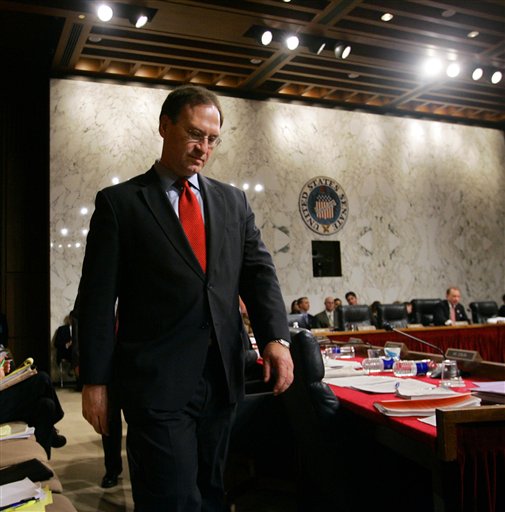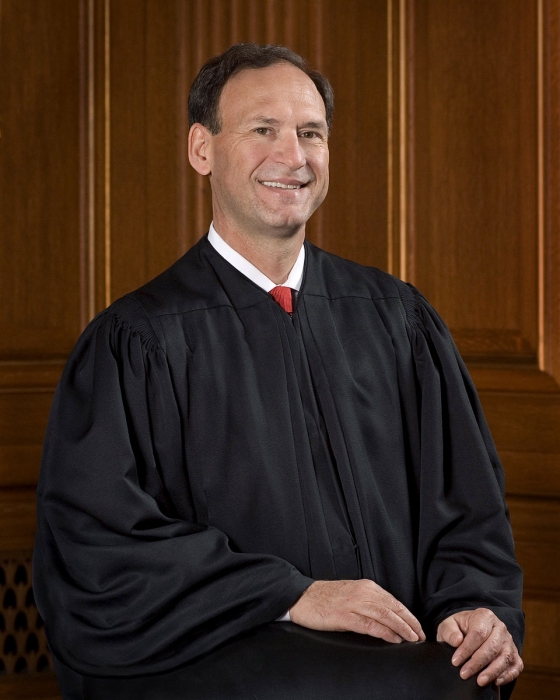Samuel A. Alito Jr. (1950– ) assumed the position of a justice on the U.S. Supreme Court in January 2006. He replaced the retiring Sandra Day O’Connor. In his years on the Court, Alito has shown some sensitivity to religious liberty but his record on free speech cases has been troubling.
Born in 1950 in Trenton, New Jersey, Alito received an undergraduate degree from Princeton in 1972 and a law degree from Yale Law School in 1975. Upon graduation from Yale, he served as a law clerk for Leonard I. Garth of the Third U.S. Circuit Court of Appeals. After his clerkship, Alito became an assistant U.S. attorney for the District of New Jersey for four years, until moving to the U.S. Department of Justice in 1981 as an assistant to the solicitor general. In 1985 he received a promotion to deputy assistant attorney general. He became U.S. attorney for New Jersey in 1987.
In 1990, President George H. W. Bush nominated Alito to the Third Circuit where he served for more than 15 years. President George W. Bush nominated him in October 2005 to serve on the Supreme Court. The Senate confirmed him by a vote of 58-42 in January 2006, making him the 110th justice to serve on the Court.

Supreme Court Justice Samuel Alito, smiles during a meeting in 2005 in Washington. On the Supreme Court, Alito again showed sensitivity to religious liberty concerns in a case filed under the Religious Liberty and Institutionalized Persons Act (RLUIPA), Holt v. Hobbs (2015). Arkansas prison officials sought to justify a policy prohibiting even short beards, because inmates might hide contraband in them. In his opinion for the Court, Alito wrote that the prison officials’ argument was “hard to take seriously.” (AP Photo/Manuel Balce Ceneta, used with permission from the Associated Press)
Alito established himself as a defender of free expression on the Third Circuit Court
While on the Third Circuit, Alito had established himself as a strong defender of commercial, student, and religious expression. He wrote the court’s opinion in Saxe v. State College Area School District (3d Cir. 2001) striking down a public school’s anti-harassment policy. Alito asserted that there is “no question that the free speech clause protects a wide variety of speech that listeners may consider deeply offensive, including statements that impugn another’s race or national origin or that denigrate religious beliefs.”
In Fraternal Order of Police v. City of Newark (3d Cir. 1999), Alito ruled that a city police department violated the free exercise of religion rights of two Muslim officers fired for refusing to shave their beards.
“Because the Department makes exemptions from its policy for secular reasons and has not offered any substantial justification for refusing to provide similar treatment for officers who are required to wear beards for religious reasons, we conclude that the Department’s policy violates the First Amendment,” he wrote.
Alito authored opinions on government speech and religious liberty cases
On the Supreme Court, Alito again showed sensitivity to religious liberty concerns in a case filed under the Religious Liberty and Institutionalized Persons Act (RLUIPA), Holt v. Hobbs (2015). Arkansas prison officials sought to justify a policy prohibiting even short beards, because inmates might hide contraband in them. In his opinion for the Court, Alito wrote that the prison officials’ argument was “hard to take seriously.”
Alito authored one of the Court’s leading decisions on government speech in Pleasant Grove v. Summum (2009). The case involved the religion of Summum’s attempt to force a Utah city to place its religious monument in a public park. The religion argued that the city engaged in viewpoint discrimination by denying its monument but placing a Ten Commandments monument in the park years earlier. Instead, Alito reasoned that monuments in a public park were a form of government speech.

Supreme Court Justice Samuel Alito returns to his seat after a break during his confirmation hearing before the Senate Judiciary Committee in 2006. Alito has written dissents in First Amendment cases such as Walker v. Sons of Confederate Veterans (2015), Snyder v. Phelps (2011), and United States v. Stevens (2010). (AP Photo/Pablo Martinez Monsivais, used with permission from the Associated Press)
Alito has written dissents in free speech cases
In a later government speech case, Walker v. Sons of Confederate Veterans (2015), Alito dissented from the Court’s finding that specialty license plates were a form of government speech. In his dissent, Alito wrote that a reasonable observer of the specialty plates would view the plates more as an expression of the car owner or driver more so than the government.
Alito filed the Court’s lone dissent in Snyder v. Phelps (2011), a case involving a protest of a military funeral by members of the Westboro Baptist Church. The Court ruled in favor of the protesters, reasoning that they complied with lawful police orders to engage in their very offensive speech. Alito viewed the issue much differently, writing passionately: “Our profound national commitment to free and open debate is not a license for the vicious verbal assault that occurred in this case.”
Alito also filed a solitary dissent in United States v. Stevens (2010), a case in which the Court invalidated a federal law criminalizing the distribution of images of animal cruelty. The Court ruled the law was overbroad, but Alito questioned whether the law really banned a substantial amount of protected speech.
David L. Hudson, Jr. is a law professor at Belmont who publishes widely on First Amendment topics. He is the author of a 12-lecture audio course on the First Amendment entitled Freedom of Speech: Understanding the First Amendment (Now You Know Media, 2018). He also is the author of many First Amendment books, including The First Amendment: Freedom of Speech (Thomson Reuters, 2012) and Freedom of Speech: Documents Decoded (ABC-CLIO, 2017). This article was originally published in 2009.

